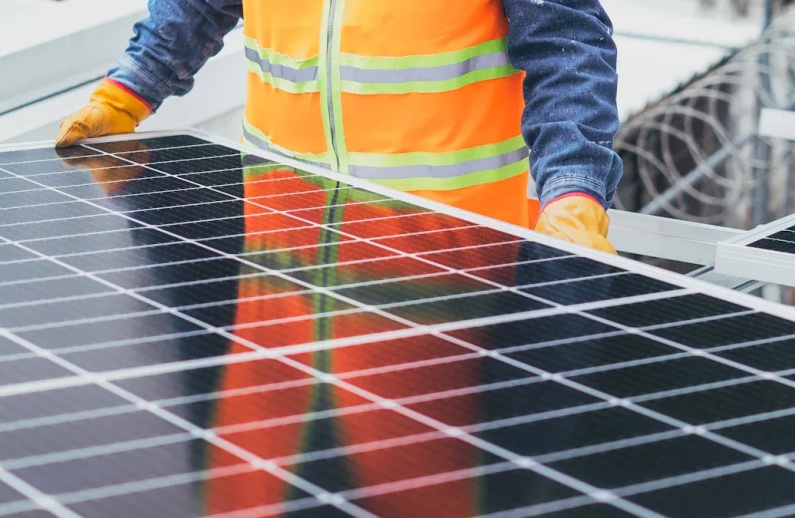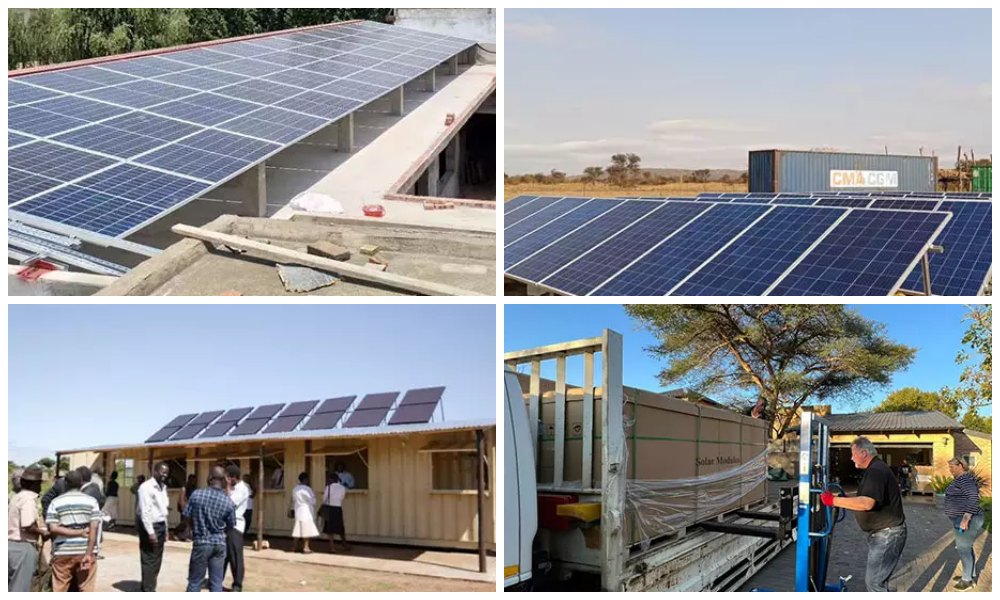Wie man einen Anbieter für netzunabhängige Solaranlagen für Gewerbebetriebe bewertet: 10 Fragen, die jeder Käufer stellen muss?
Jeder Einkäufer sollte diese zehn Fragen stellen, um einen Lieferanten für große Solaranlagen effektiv zu bewerten. Diese Fragen sind besonders wichtig für Unternehmen, die planen kommerzielles netzunabhängiges Solarsystem Installationen, da diese Projekte höhere Investitionen und langfristige Leistungsanforderungen mit sich bringen:
● Seit wie vielen Jahren ist das Unternehmen in diesem Bereich tätig?
● Über welche Zertifizierungen und Lizenzen verfügt der Lieferant?
● Kann der Lieferant Referenzen oder Fallstudien vorlegen?
● Wie überprüft der Lieferant den Energieverbrauch?
● Führt der Lieferant eine vollständige Standortanalyse durch?
● Wie ist die Qualität der Systemkomponenten?
● Wie leistungsstark und effizient ist das von ihnen vorgeschlagene System?
● Ist der Vorschlag einfach und leicht verständlich?
● Welche Unterstützung und Wartung bietet der Lieferant an?
● Welche Garantien, Gewährleistungen und Preise sind inbegriffen?
Die Verwendung dieser Fragen als Checkliste hilft Einkäufern, Fehler bei der Lieferantenbewertung zu vermeiden. Viele Einkäufer vergessen, die Vertrauenswürdigkeit des Lieferanten, die Produktqualität und die langfristigen Kosten zu prüfen. Manche vergewissern sich nicht, ob der Lieferant ihren Energiebedarf decken kann. Andere verwechseln den Tier-1-Status mit tatsächlicher Finanzkraft. Durch gezielte Fragen können Einkäufer Probleme erkennen und fundierte Entscheidungen treffen.

Die Glaubwürdigkeit eines Lieferanten ist von entscheidender Bedeutung. Sie stärkt das Vertrauen der Käufer und minimiert Risiken. Durch die Überprüfung eines Lieferanten sichern Käufer ihr Geld ab und stellen sicher, dass die Solaranlage einwandfrei funktioniert. Ein glaubwürdiger Lieferant ist zuverlässig, hält sich an Regeln und kann Referenzen aus der Vergangenheit vorweisen. Einige Ingenieurbüros, wie beispielsweise Anern, teilen ihre Erfahrung in diesem Bereich. industrielle Solarenergiesysteme, was Käufern hilft, die tatsächliche Leistungsfähigkeit des Projekts zu verstehen.
Die Erfahrung eines Anbieters gibt Käufern Aufschluss über dessen Zuverlässigkeit. Unternehmen mit langjähriger Erfahrung im Solarbereich sind oft stabiler und können auf eine gute Arbeitsbilanz verweisen. Käufer sollten folgende Punkte prüfen:
● Jahrelange Geschäftstätigkeit: Mehr Jahre bedeuten mehr Erfahrung und Vertrauen.
● Garantien: Gute Lieferanten geben klare Garantien für Geräte und Arbeitsleistungen.
● Online-Reputation: Rezensionen und Bewertungen zeigen, was Kunden denken.
Tipp: Suchen Sie nach Kundenbewertungen auf vertrauenswürdigen Webseiten. Viele positive Bewertungen deuten darauf hin, dass der Anbieter vertrauenswürdig ist.
| Faktor | Beschreibung |
|---|---|
| Garantien | Solaranlageninstallateure geben oft Garantien für die Geräte und die ausgeführten Arbeiten. |
| Zeit im Geschäft | Die Dauer der Geschäftstätigkeit eines Unternehmens zeigt, ob es stabil und zuverlässig ist. |
| Online-Reputation | Kundenrezensionen geben Aufschluss über die Servicequalität und warnen vor Problemen. |
Zertifizierungen und Lizenzen belegen, dass ein Lieferant die Sicherheits- und Qualitätsstandards erfüllt. Zertifizierungen anderer Organisationen stärken das Vertrauen der Käufer in den Lieferanten. Dies ist besonders wichtig für Solaranlagen, die jahrzehntelang halten müssen, insbesondere in abgelegenen Gebieten, wo sie viel Zeit benötigen. industrielle ferngesteuerte Solarenergiesysteme.
Zertifizierungen belegen zudem, dass Solarmodule und -komponenten den geltenden Normen entsprechen. Dies gibt Käufern die Gewissheit, dass ihr System einwandfrei funktioniert und lange hält.
Käufer sollten Folgendes prüfen:
● GST-Registrierung für legale Unternehmen.
● ISO 9000-2015 für Servicequalität.
● NABCEP-Zertifizierung, die in der Solarbranche hohes Ansehen genießt.
● Staatliche Lizenzen für Elektro- und Solaranlagenbauer.
● Spezielle Zertifizierungen wie Solar PV Associate, Installation Professional, Technical Sales Professional und Design Specialist.
Um zu überprüfen, ob Dokumente echt sind, sollten Käufer Folgendes tun:
● Achten Sie auf offizielle Logos und korrekte Firmennamen.
● Vermeiden Sie Zertifikate mit Fehlern, unscharfen Bildern oder fehlenden Nummern.
● Fragen Sie nach der Zertifikats-ID und dem Datum.
● Überprüfen Sie auf der Website des Zertifizierungsanbieters, ob die Zertifizierung gültig ist.
● Stellen Sie sicher, dass der Name des Lieferanten und die Zertifizierung übereinstimmen.
● Wenden Sie sich an den Zertifizierer, wenn Ihnen etwas komisch vorkommt.
Hinweis: Echte Zertifikate enthalten genaue Angaben und können beim Zertifizierer überprüft werden.

Referenzen und Fallstudien zeigen, ob ein Lieferant Projekte erfolgreich abschließen kann. Käufer sollten nach Beispielen ähnlicher Arbeiten fragen und mit ehemaligen Kunden sprechen, um deren Erfahrungen kennenzulernen.
Unternehmen wie Anern veröffentlichen beispielsweise Fallstudien zu verschiedenen Ländern und Terrains, was bei der Bewertung von Anbietern für industrielle Solaranlagen oder hybride Energielösungen hilfreich ist.
Gute Referenzen und Fallstudien sollten Folgendes enthalten:
● Erfahrung mit Projekten wie dem des Käufers.
● Kenntnisse der lokalen Regeln und Märkte.
● Einsatz geeigneter Analysetools und Software.
● Qualifizierte Teammitglieder.
● Korrekte Finanzberichte und -details.
● Unterstützung während des Projekts.
● Klare Projektzeitpläne.
● Verweise auf ähnliche Arbeiten.
Warnung: Vorsicht vor übertriebenen Versprechungen, unklaren Berichten oder mangelhafter Kommunikation. Dies kann darauf hindeuten, dass der Lieferant unzuverlässig ist.
Wenn Käufer diese Schritte befolgen, können sie die Glaubwürdigkeit eines Anbieters überprüfen. Dies hilft ihnen, Fehler zu vermeiden und eine gute Solaranlage zu erhalten.
Eine netzunabhängige Solaranlage für Gewerbebetriebe muss optimal an den Standort angepasst sein. Sie sollte aus robusten und hochwertigen Komponenten bestehen. Käufer sollten prüfen, ob der Anbieter eine sorgfältige Planung vorgenommen hat. Gutes Design und hohe Qualität tragen wesentlich zur Langlebigkeit der Anlage bei. Jeder Schritt ist wichtig, von der Überprüfung des Energieverbrauchs bis zur Auswahl der passenden Komponenten.
Ein Energieversorger muss den Energieverbrauch des Standorts prüfen. Dies hilft ihm, ein System zu entwickeln, das den tatsächlichen Bedürfnissen entspricht. Er sollte alte Stromrechnungen und Geräteinformationen anfordern. Der Versorger sollte auch zukünftige Änderungen, wie z. B. neue Maschinen oder ein größeres Gebäude, berücksichtigen.
Käufer sollten prüfen, ob der Lieferant:
● Betrachtet Energiedaten von mindestens 12 Monaten.
● Fragt nach den Zeiten, zu denen der Energieverbrauch am höchsten ist.
● Pläne für einen höheren Energieverbrauch in der Zukunft.
● Erklärt, wie das System mit hoher Auslastung umgeht.
Tipp: Ein guter Anbieter nutzt Software zur Überprüfung des Energieverbrauchs. Die Ergebnisse sollten im Tarif aufgeführt sein.
Eine gründliche Standortanalyse hilft dem Lieferanten, ein passendes System zu entwickeln. Die Analyse sollte viele Aspekte umfassen. Der Lieferant muss den Standort besuchen und wichtige Informationen sammeln.
Wichtige Bestandteile einer Standortanalyse sind:
● Standortinformationen: Name und Art des Gebäudes.
● Dachinformationen: Art, Größe, Neigung und Beschattung.
● Hauptwechselstromanschluss: Hier wird der Hauptstrom zugeführt.
● Wechselrichterstandort: Wo der Wechselrichter aufgestellt werden soll.
● Fernüberwachung: Wie das System überwacht wird.
● Beurteilung: Sonnenlicht und örtliche Vorschriften.
Käufer sollten eine Kopie des Gutachtens anfordern. Sie sollten auf aussagekräftige Fotos, Maßangaben und Anmerkungen achten. Der Anbieter sollte etwaige Mängel, wie beispielsweise Probleme mit Schattenwurf oder dem Dach, erläutern.
Hinweis: Eine gründliche Standortanalyse hilft, Probleme zu vermeiden und sicherzustellen, dass das System einwandfrei funktioniert.
Die Qualität von Solarmodulen, Wechselrichtern, Batterien und Kabeln ist entscheidend. Käufer sollten sich nach den verwendeten Marken und Modellen erkundigen und prüfen, ob die Komponenten über gute Garantien und Kundenbewertungen verfügen.
Häufige Probleme sind:
● Wechselrichterausfälle
● Verschleiß an den Paneelen
● Fehlerhafte Verkabelung
● Schatten und Blockaden
● Überwachungsprobleme
Ein guter Lieferant wählt Teile aus, die diese Probleme vermeiden. Er sollte auf bewährte Marken zurückgreifen und seine Auswahl erläutern.
Warnung: Billige Teile sparen zwar jetzt Geld, können aber später teurer zu stehen kommen.
Die Effizienz gibt an, wie gut das System aus Sonnenlicht Strom erzeugt. Langlebigkeit bedeutet, dass das System viele Jahre lang weitgehend störungsfrei funktioniert. Käufer sollten sich nach der Effizienz und der Funktionsweise des Systems erkundigen.
Der Wirkungsgrad von Solarmodulen gibt an, wie viel Sonnenlicht in Strom umgewandelt wird. Das Leistungsverhältnis (PR) vergleicht die tatsächliche Leistung mit der erwarteten Leistung. Die meisten kommerziellen Anlagen in den USA weisen ein PR von etwa 93,5 % auf. In Kalifornien liegt der durchschnittliche PR bei 91,7 %. Ältere Anlagen in anderen Regionen erreichten einen PR zwischen 66 % und 70 %.
Käufer sollten Folgendes beachten:
● Hoher Modulwirkungsgrad
● PR über 90 %
● Klare Informationen zur zu erwartenden Leistung
● Pläne für regelmäßige Vorsorgeuntersuchungen
Tipp: Bitten Sie den Anbieter, Angaben zu Effizienz und Langlebigkeit in den Plan aufzunehmen. Dies hilft Käufern, das beste System zu vergleichen und auszuwählen.
Käufer sollten darauf achten, wie ein Anbieter mit seinen Kunden kommuniziert. Gute Anbieter beantworten Fragen und bieten auch nach dem Kauf Unterstützung. Transparente Preise und faire Angebote schaffen Vertrauen. Ein guter Service sorgt für eine lange Lebensdauer der Solaranlage.
Ein gutes Angebot erläutert das gesamte Projekt. Es listet alle benötigten Geräte auf und zeigt den Zeitplan an. Die Kosten werden detailliert aufgeschlüsselt, sodass Käufer jeden einzelnen Posten nachvollziehen können. Käufer sollten auf einfache Sprache und klare Zahlen achten. Das Angebot sollte außerdem darlegen, wie das System den Energiebedarf deckt.
Vorsicht vor Solarfirmen, die unangekündigt an Ihrer Tür klingeln. Diese Firmen sind möglicherweise mehr am Verkauf als an Ihrer Unterstützung interessiert.
Einige Warnsignale in Vorschlägen sind:
● Große Webseiten, aber keine echte Adresse.
● Schlechte Bewertungen oder zu viele perfekte Bewertungen.
● Versprechen, die zu schön klingen, um wahr zu sein.
Ein Lieferant sollte über lokale und bundesweite Sparmöglichkeiten informiert sein. Er sollte einen Plan haben, um Käufern zu helfen, diese Einsparungen zu nutzen.
Eine gute Betreuung sorgt für den reibungslosen Betrieb der Solaranlage. Ein guter Plan beinhaltet:
● Regelmäßige Überprüfungen mit Online-Tools oder Apps.
● Das System zweimal im Jahr beobachten, insbesondere nach Stürmen.
● Die Paneele ein- bis zweimal im Jahr reinigen.
● Überprüfung der Batterien auf Rost und Wasser.
● Den Bereich um den Wechselrichter sauber halten und die Kabel überprüfen.
Ein Lieferant sollte angeben, wie er Probleme behebt und an wen man sich bei Problemen wenden kann.
Garantien helfen Käufern, unerwartete Kosten zu vermeiden. Ein Anbieter sollte klare Garantien für die Geräte und die ausgeführten Arbeiten geben. Käufer sollten nach der Dauer und dem Umfang der Garantien fragen. Leistungsgarantien zeigen, dass der Anbieter seinem System vertraut.
Transparente Preise helfen Käufern, versteckte Kosten zu vermeiden. Ein guter Anbieter ermöglicht es Käufern, die Preise einzusehen, ohne persönliche Daten preiszugeben. Da jedes Projekt anders ist, sollte der Anbieter erläutern, wie er die Preise kalkuliert.
Wichtige Vertragsbedingungen sind:
● Welche Dienstleistungen und Produkte sind enthalten?
● Wann bezahlen?
● Leistungsgarantien
● Wem gehört das System?
● Sicherungsrecht bis zur vollständigen Bezahlung
● Wie man das System prüft und misst
Käufer sollten alle Vertragsbedingungen sorgfältig lesen und Fragen stellen, bevor sie unterschreiben. Bei der Auswahl eines Lieferanten sollten sie auf Ehrlichkeit, verständliche Antworten und guten Kundenservice achten.
Anhand dieser zehn Fragen können Käufer einen guten Anbieter auswählen. Diese Checkliste hilft ihnen, größere Probleme zu vermeiden und Geld zu sparen. Sie verhindert beispielsweise Kreditausfälle oder eine mangelhaft funktionierende Solaranlage. Käufer, die auf Erfahrung achten, Referenzen einholen und Garantien prüfen, sind später zufriedener. Sie sollten außerdem genauer nachfragen, wie die Anlage installiert wird, wie lange die Installation dauert und welche Leistungen versprochen werden. Sich Zeit zu nehmen und auf sein Bauchgefühl zu hören, hilft Käufern, bessere Entscheidungen zu treffen und dauerhaft gute Ergebnisse zu erzielen.

Add :5th Floor, Building B, No.2817 Kaichuang Avenue, Science Zone, Huangpu District, Guangzhou, China
Anern Industry Group Limited Alle Rechte vorbehalten
.Xml | Datenschutzrichtlinie  NETZWERK UNTERSTÜTZT
NETZWERK UNTERSTÜTZT